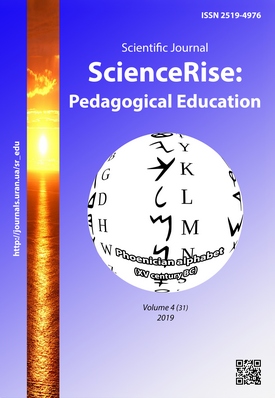Professional-synergetic scientific-methodic competency of teachers in the postgraduate pedagogical education system
DOI:
https://doi.org/10.15587/2519-4984.2019.174305Keywords:
professional-synergetic scientific methodical competence of teachers, functional-philosophical, general scientific, concrete scientific, postgraduate pedagogical educationAbstract
This article analyzes synergetic parameters of pedagogy as determinants of creative learning, reveals conceptual, theoretical-methodological, functional and competence bases of synergetic pedagogy formation as a new interdisciplinary field of the professional-pedagogic activity. There is determined the author definition of the notion “synergetically oriented scientific-methodical competence of teachers” as a multi-component integral system of equivalent general (universal, key) and professional competences, realized through all learning stages during life by combining, mutually using and adding forms, methods, means and technologies, creating the methodical support of the educational process and based on it, scientific statements and argued results as a consequence of making studies in a certain field of science, solving complicated scientific-theoretical or practical problems. There are defined and concretized system qualities, abilities, readiness to form the professional-synergetic scientific-methodical competence of teachers.
There is considered in detail the importance of the professional-synergetic scientific-methodical competence of teachers, conditioned by its functions: for teachers: self-determination, self-motivation; self-reflection and creativity; self-education, self-improvement and self-development self-realization and self-regulation adaptive socialization; ego-protection; self-prophylaxis and self-rehabilitation; for a staff of postgraduate pedagogical educational institutions: treating-monitoring functions; organizational-projecting; methodical, methodological; partner-socializing; psychological-emotional; supporting-realizing; analytic-regulating.
There is concretized, that depending on content of the professional-synergetic scientific methodical competence of teachers, educators and levels of cognitive and technological operational components, main functional groups of partial competences are determined: functional-philosophical, general scientific, concrete scientific, scientific-methodical competence and their structure is determined for defining the categorical apparatus and terminological base of this study.
There is summarized, that the effectiveness of forming the professional-synergetic scientific methodical competence of teachers in the system of postgraduate pedagogical education, from our point of view, depends on integration of possibilities of its realization in formal, non-formal and informal education. It is vitally important for a teacher, educator to realize continuous professional education, applying innovative forms and methods, forming a personality of students and also demonstrating such attitude to learning on own example, realizing own individual educational trajectory
References
- Ziaziun, I. A. (2012). Synerhetychni parametry pedahohiky yak determinanty kreatyvnoho navchannia. Kreatyvna pedahohika, 5, 7–13.
- Isaienko, V. M., Ridei, N. M., Navrotska, D. V., Bohutskyi, Yu. P., Ulishchenko, A. B. (2019). Synerhetychna pedahohika. Kyiv, 416.
- Ridei, N. M., Bohutskyi, Yu. P., Sholudiak, A. A. (2015). Suchasnyi stan doslidzhennia u sferi upravlinnia osvitoiu: analiz kerivnytstva VNZ. Nova pedahohichna dumka, 3, 2–30.
- Tolochko, S., Ridey, N. (2017). Theoretical substantiation of the necessity of formation of scientific-methodological competence of teachers in the system of postgraduate pedagogical education. ScienceRise: Pedagogical Education, 8 (16), 14–19. doi: http://doi.org/10.15587/2519-4984.2017.108974
- Tolochko, S. V. (2017). Naukovo-doslidnyi komponent naukovo-metodychnoi kompetentnosti vykladachiv u systemi pisliadyplomnoi pedahohichnoi osvity. Nova pedahohichna dumka, 3 (91), 14–18.
- Tolochko, S. (2019). Integrated competence of teaching and academic staff for the system of postgraduate pedagogical education. ScienceRise: Pedagogical Education, 1 (28), 22–29. doi: http://doi.org/10.15587/2519-4984.2019.155145
- Hammons, A. J., Fiese, B., Koester, B., Garcia, G. L., Parker, L., Teegarden, D. (2019). Increasing undergraduate interdisciplinary exposure through an interdisciplinary web-based video series. Innovations in Education and Teaching International, 1–11. doi: http://doi.org/10.1080/14703297.2019.1635902
- Karen, P. I., Bush, S. R. (2010). Educating students to cross boundaries between disciplines and cultures and between theory and practice. International Journal of Sustainability in Higher Education, 11 (1), 19–35. doi: http://doi.org/10.1108/14676371011010020
- Orazbayevaa, K. (2016). Professional Competence of Teachers in the Age of Globalization. International Journal of Environmental & Science Education, 11 (9), 2659–2672.
- Ridey, N. M., Tolochko, S. V. (2017). Methodology of expert assessment of the results of cognition, programs and development plans. Development and modernization of pedagogical and psychological sciences: experience of Poland and prospects of Ukraine. Vol. 3, 170–189.
Downloads
Published
How to Cite
Issue
Section
License
Copyright (c) 2019 Svitlana Tolochko

This work is licensed under a Creative Commons Attribution 4.0 International License.
Our journal abides by the Creative Commons CC BY copyright rights and permissions for open access journals.
Authors, who are published in this journal, agree to the following conditions:
1. The authors reserve the right to authorship of the work and pass the first publication right of this work to the journal under the terms of a Creative Commons CC BY, which allows others to freely distribute the published research with the obligatory reference to the authors of the original work and the first publication of the work in this journal.
2. The authors have the right to conclude separate supplement agreements that relate to non-exclusive work distribution in the form in which it has been published by the journal (for example, to upload the work to the online storage of the journal or publish it as part of a monograph), provided that the reference to the first publication of the work in this journal is included.








